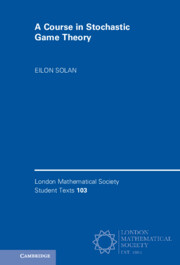Book contents
- Frontmatter
- Dedication
- Contents
- Introduction
- 1 Markov Decision Problems
- 2 A Tauberian Theorem and Uniform ∈-Optimality in Hidden Markov Decision Problems
- 3 Strategic-Form Games: A Review
- 4 Stochastic Games: The Model
- 5 Two-Player Zero-Sum Discounted Games
- 6 Semi-Algebraic Sets and the Limit of the Discounted Value
- 7 B-Graphs and the Continuity of the Limit limλ→0 ʋλ(s;q,r)
- 8 Kakutani’s Fixed-Point Theorem and Multiplayer Discounted Stochastic Games
- 9 Uniform Equilibrium
- 10 The Vanishing Discount Factor Approach and Uniform Equilibrium in Absorbing Games
- 11 Ramsey’s Theorem and Two-Player Deterministic Stopping Games
- 12 Infinite Orbits and Quitting Games
- 13 Linear Complementarity Problems and Quitting Games
- References
- Index
12 - Infinite Orbits and Quitting Games
Published online by Cambridge University Press: 05 May 2022
- Frontmatter
- Dedication
- Contents
- Introduction
- 1 Markov Decision Problems
- 2 A Tauberian Theorem and Uniform ∈-Optimality in Hidden Markov Decision Problems
- 3 Strategic-Form Games: A Review
- 4 Stochastic Games: The Model
- 5 Two-Player Zero-Sum Discounted Games
- 6 Semi-Algebraic Sets and the Limit of the Discounted Value
- 7 B-Graphs and the Continuity of the Limit limλ→0 ʋλ(s;q,r)
- 8 Kakutani’s Fixed-Point Theorem and Multiplayer Discounted Stochastic Games
- 9 Uniform Equilibrium
- 10 The Vanishing Discount Factor Approach and Uniform Equilibrium in Absorbing Games
- 11 Ramsey’s Theorem and Two-Player Deterministic Stopping Games
- 12 Infinite Orbits and Quitting Games
- 13 Linear Complementarity Problems and Quitting Games
- References
- Index
Summary
In this chapter, we define infinite orbits and show how to approximate such orbits. We prove that for every function that has no fixed point there is an approximate infinite orbit with unbounded variation, and we use this result to show that a certain class of quitting games admits undiscounted $\ep$-equilibria.
Information
- Type
- Chapter
- Information
- A Course in Stochastic Game Theory , pp. 211 - 235Publisher: Cambridge University PressPrint publication year: 2022
